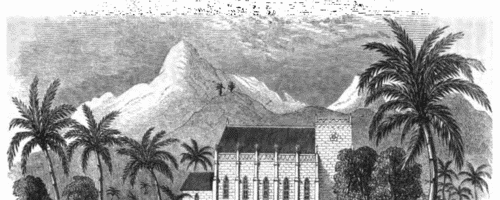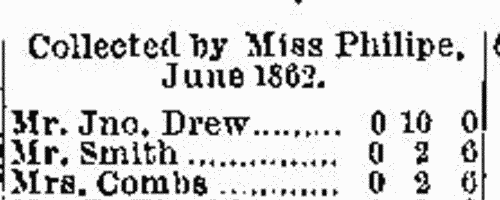Macbrair Surname Ancestry ResultsOur indexes 1000-1999 include entries for the spelling 'macbrair'. In the period you have requested, we have the following 13 records (displaying 1 to 10): Buy all | | | Get all 13 records to view, to save and print for £68.00 |
These sample scans are from the original record. You will get scans of the full pages or articles where the surname you searched for has been found. Your web browser may prevent the sample windows from opening; in this case please change your browser settings to allow pop-up windows from this site. Scottish litigants, rebels and cautioners
(1569-1578)
The Privy Council of Scotland exercised a superior judicial authority in the kingdom, and consequently received and dealt with a constant stream of petitions, as well as dealing with the internal security of the state. This register of the council from July 1569 to June 1578, in the reign of king James VI, was edited by John Hill Burton, Historiographer Royal for Scotland, and published under the direction of the Lord Clerk Register of Scotland in 1878. Some of the individuals mentioned are the complainants, those of whom they complained, and the sureties on both sides: at this period, some of the complainants are alleging serious attacks, often of a feuding nature. Many of the bonds entered into by the cautioners are promises to keep the peace towards such enemies. Failure to answer to the council when summoned was a serious contempt, leading to being denounced a rebel, with serious consequences. But 'horning' was also used in the pursuit of debts: there was no imprisonment for debt in Scotland, but a creditor could have an obstinate debtor ordered, in the sovereign's name, to pay what was due, failing which, the debtor could be put to the horn, denounced as a rebel, and imprisoned as a rebel.
MACBRAIR. Cost: £4.00.  | Sample scan, click to enlarge

| Scottish litigants, rebels and cautioners
(1578-1585)
The Privy Council of Scotland exercised a superior judicial authority in the kingdom, and consequently received and dealt with a constant stream of petitions, as well as dealing with the internal security of the state. This register of the council from 17 June 1578 to 31 July 1585, in the reign of king James VI, was edited by David Masson, and published under the direction of the Lord Clerk Register of Scotland in 1880. Some of the individuals mentioned are the complainants, those of whom they complained, and the sureties on both sides: at this period, some of the complainants are alleging serious attacks, often of a feuding nature. Many of the bonds entered into by the cautioners are promises to keep the peace towards such enemies. Failure to answer to the council when summoned was a serious contempt, leading to being denounced a rebel, with serious consequences. But 'horning' was also used in the pursuit of debts: there was no imprisonment for debt in Scotland, but a creditor could have an obstinate debtor ordered, in the sovereign's name, to pay what was due, failing which, the debtor could be put to the horn, denounced as a rebel, and imprisoned as a rebel. The main text (to page 762) is from the Acta Secreti Concilii, containing the minutes of the Privy Council, and of occasional Conventions of the Estates. After that are printed some miscellaneous Privy Council documents from the same years. The sources most productive of names, the Acta Cautionis and Registration of Bands, are also the most repetitive in form, and are not transcribed verbatim and literatim: nevertheless, one of the editor's rules was for 'All proper names and names of places occurring in the originals to be preserved in the abstracts without exception, and in the exact original spelling.'
MACBRAIR. Cost: £4.00.  | Sample scan, click to enlarge

| Scottish litigants, rebels and cautioners
(1585-1592)
The Privy Council of Scotland exercised a superior judicial authority in the kingdom, and consequently received and dealt with a constant stream of petitions, as well as dealing with the internal security of the state. This register of the council from 1 August 1585 to 31 July 1592, in the reign of king James VI, was edited by David Masson, and published under the direction of the Lord Clerk Register of Scotland in 1881. Some of the individuals mentioned are the complainants, those of whom they complained, and the sureties on both sides: at this period, some of the complainants are alleging serious attacks, often of a feuding nature. Many of the bonds entered into by the cautioners are promises to keep the peace towards such enemies. Failure to answer to the council when summoned was a serious contempt, leading to being denounced a rebel, with serious consequences. But 'horning' was also used in the pursuit of debts: there was no imprisonment for debt in Scotland, but a creditor could have an obstinate debtor ordered, in the sovereign's name, to pay what was due, failing which, the debtor could be put to the horn, denounced as a rebel, and imprisoned as a rebel. The main text (to page 774) is from the Acta Secreti Concilii, containing the minutes of the Privy Council, with intermixed Acta Proper (political edicts), Decreta (judicial decisions), Acta Cautionis (acts of caution) and Bands (registration of bonds). After that are printed some miscellaneous Privy Council documents from the same years: additional acts of caution (775-778); ordinances and acts anent the Borders and the North (779-814); and miscellaneous privy council papers (815-834). The sources most productive of names, the Acta Cautionis and Registration of Bands, are also the most repetitive in form, and are not transcribed verbatim and literatim: nevertheless, one of the editor's rules was for 'All proper names and names of places occurring in the originals to be preserved in the abstracts without exception, and in the exact original spelling.'
MACBRAIR. Cost: £4.00.  | Sample scan, click to enlarge

| Scottish litigants, rebels and cautioners
(1592-1599)
The Privy Council of Scotland exercised a superior judicial authority in the kingdom, and consequently received and dealt with a constant stream of petitions, as well as dealing with the internal security of the state. This register of the council from August 1592 to May 1599, in the reign of king James VI, was edited by David Masson and published under the direction of the Deputy Clerk Register of Scotland in 1882. The publication brings together the contents of the principal register (Acta Secreti Concilii) with acts and bands (bonds) of caution (surety) from the registers called Acta Cautionis (pp 561-730); Acts and Ordinances relating to the Borders and the North (731-748); and Miscellaneous Privy Council Papers (749-769). Many of the individuals mentioned are the complainants, those of whom they complained, and the sureties on both sides: at this period, many of the complainants are alleging serious attacks, often of a feuding nature. Many of the bonds entered into by the cautioners are promises to keep the peace towards such enemies. Failure to answer to the council when summoned was a serious contempt, leading to being denounced a rebel, with serious consequences.
MACBRAIR. Cost: £4.00.  | Sample scan, click to enlarge

| News from Congregational and Independent churches
(1855)
The Congregational and a number of other independent churches together formed the Evangelical Alliance, committed to promoting and supporting missions to the heathen. The areas chosen for their projects were Guiana, South Africa, India, the South Seas and China. The work of the missionaries was not only in preaching the Gospel, but also in translating the Bible into local languages, and establishing churches, schools and orphanages. Orphans and native teachers were often given the names of principal contributors or congregations back in Britain. In Britain the large amounts of money needed for this work were raised among the Congregational and independent congregations, arranged by auxiliaries for each county (although some contributions for each county might in fact come in from congregations and individuals in neighbouring areas); money was gathered by ministers, at special services, by supporters, and in missionary boxes. The accounts of all these contributions were published as part of a monthly magazine called the Evangelical Magazine. Each issue of the magazine carried obituaries of prominent members of the congregations; general articles on religion; reviews of newly-published religious books; home news, mainly about meetings of importance or interest by the alliance or in individual churches; and then a separate section called the Missionary Chronicle. The Missionary Chronicle was devoted to letters and reports from the missionaries; and concludes with a set of accounts of donations towards the missionary work. This is the index to the home news reported in the magazine, January to December 1855.MACBRAIR. Cost: £6.00.  | Sample scan, click to enlarge

| Missionaries and contributors
(1863)
The Evangelical Magazine and Missionary Chronicle records the work of Christian missionaries throughout the world, and of the supporting missionary societies collecting money for the work in the British Isles. Contributions are listed by congregation, and by family members making donations.MACBRAIR. Cost: £8.00.  | Sample scan, click to enlarge

| Science Schools and Classes: Elementary Examination: Class Lists
(1869)
The Science and Art Department of the Committee of Council on Education published these class lists giving the names of all the successful candidates in the examination of science schools and classes taken in May 1869. The candidates were of three levels: honours; second stage or advanced examination; third stage or elementary examination. Twenty-three subjects were offered. These are the lists for the elementary examination. The tables, arranged subject by subject, give the candidate's full name (surname first), age, and occupation - or, in the case of those not yet of working age, father's occupation, preceded by (f.). Many candidates sat and were successful in more than one subject, and so appear in more than one list. The subjects are: I. Practical, Plane and Solid Geometry; II. Machine Construction; III. Building Construction; IV. Elementary Mathematics; V. Higher Mathematics; VI. Theoretical Mechanics; VII. Applied Mechanics; VIII. Acoustics, Light, and Heat: IX. Magnetism and Electricity; X. Inorganic Chemistry; XI. Organic Chemistry; XII. Geology; XIII. Mineralogy; XIV. Animal Physiology; XV. Zoology; XVI. Vegetable Anatomy and Physiology; XVII. Systematic and Economic Botany; XVIII. Mining; XIX. Metallurgy; XX. Navigation; XXI. Nautical Astronomy; XXII. Steam; XXIII. Physical Geography. MACBRAIR. Cost: £6.00.  | Sample scan, click to enlarge

| Debtors, Insolvents and Bankrupts
(1882)
Bills of sale (binding assets to a creditor/lender), insolvencies and bankruptcies in England and Wales, April to June 1882MACBRAIR. Cost: £6.00.  | Sample scan, click to enlarge

| Partnerships Dissolved
(1882)
Dissolution of trading partnerships, or removal of a partner from a business, in England and WalesMACBRAIR. Cost: £6.00.  | Sample scan, click to enlarge

| Members of the Association of Municipal and Sanitary Engineers and Surveyors
(1886)
The alphabetical list of members of the association gives surname and christian name or initials, qualifications, and current official position.MACBRAIR. Cost: £4.00.  | Sample scan, click to enlarge

|
| 1 | 2 |  |
Research your ancestry, family history, genealogy and one-name study by direct access to original records and archives indexed by surname.
|












